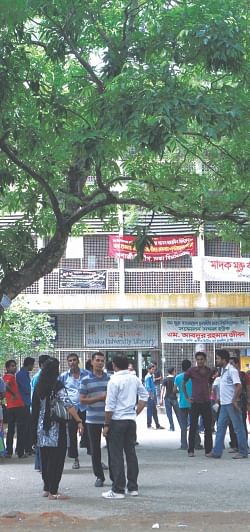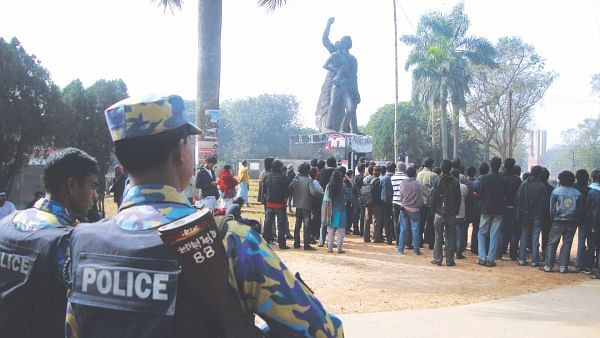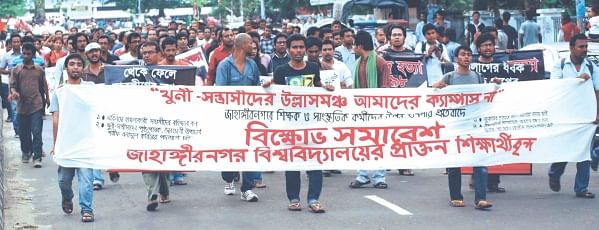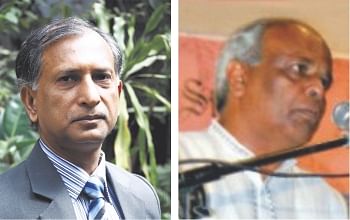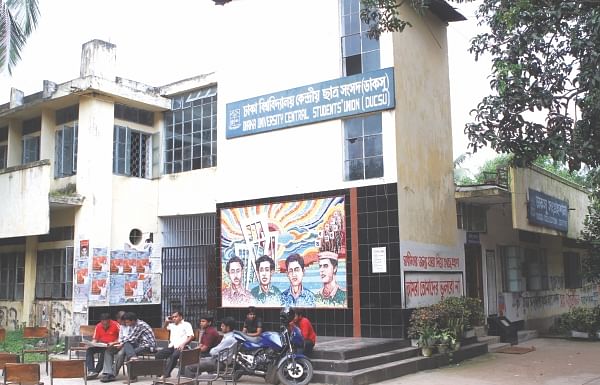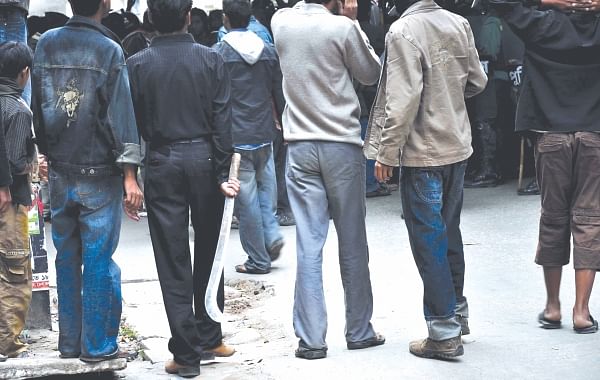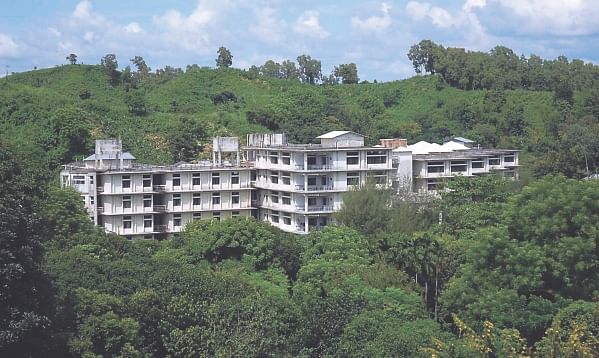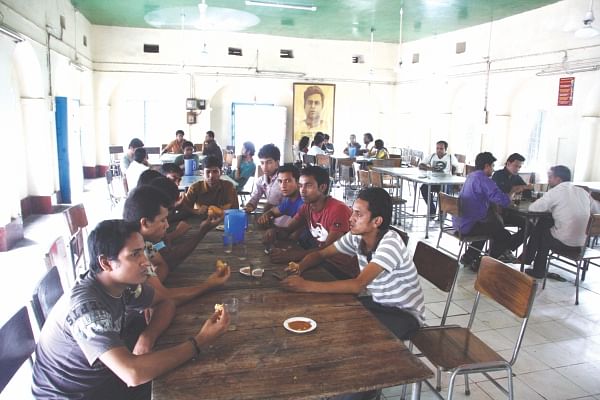| Home - Back Issues - The Team - Contact Us |
 |
| Volume 11 |Issue 20| May 18, 2012 | |
|
|
Cover Story
Inside the Autonomous Bodies The universities of Dhaka, Rajshahi, Chittagong and Jahangirnagar are top rated autonomous institutions. Under the provisions of the Acts that give autonomy to these universities, the nature of their organisational structure is supposed to be democratic. However, the de facto state of these universities is that VCs get appointed and dismissed according to shifts in national politics. Akram Hosen Mamun The Vice-Chancellor shall be appointed by the Chancellor for a period of four years from a panel of three persons to be nominated by the Senate on such terms and conditions as may be determined by the Chancellor, and shall be eligible for re-appointment for a further period of four years. For the last four months, the Vice Chancellor (VC) of Jahangirnagar University (JU) has frequently hit the headlines but for the wrong reasons. In fact, in terms of the allegations against him, Prof Shariff Enamul Kabir is arguably the most controversial VC of a public university ever. His alleged anomalies in recruitment of new faculty members alone have earned him much media attention, not to mention the damage he caused to the ecological balance of the campus (indiscriminate felling of some rare species of trees). He was appointed--as opposed to being elected--for the position three years ago. But it was not until the murder of Zubair Ahmed, a fourth year student, on January 9, this year, that organised protests by teachers and students against him took place. The protests have met with violence and other forms of oppression by the supporters of Prof Kabir. Due to the protests, disruption of academic activities in the campus has also reached unprecedented scale in the last four months. In defiance of all this, the VC still remains complacently in office. "He is taking advantage of the absence of the democratic principles that are supposed to run the university," says Prof Nasim Akhtar Hossain, convenor of Shikkhak Samaj, an organisation of teachers that demand immediate resignation of VC. Despite repeated attempts, Prof Kabir could not be reached for his comments. The universities of Dhaka, Rajshahi, Chittagong and Jahangirnagar are autonomous institutions. Under the provisions of the Acts that give autonomy to these universities, the nature of their organisational structure is supposed to be democratic. However, the de facto state of these universities is that VCs get appointed and dismissed according to shifts in national politics. Students, moreover, who constitute the largest part of the university family, have not had their representatives in the senates for more than two decades. By ousting military dictator Ershad, the people of Bangladesh restored democracy in the country in 1990. The irony is, the Central Students' Unions that defend the students' institutional democratic rights in the campus, have been defunct since the restoration of democracy in the country.
In January 2009 Professor AAMS Arefin Siddique, was appointed the VC of Dhaka University to temporarily conduct its academic and administrative affairs, replacing the previous VC who had been appointed by the BNP-led government. After three years, he still occupies the position by simply not calling a senate session to select a panel for appointing a regular VC. About the legitimacy of his being the VC for such a long time, in a very brief comment, he says, “The Chancellor has the right to appoint the VC anytime.” He also implies that his appointment was not in violation of the 1973 DU Order. But most of the senators of the institution beg to differ. “No doubt the government is not committing an illegal act by letting this VC operate the way he is operating and definitely, he has been selected for this position by the government. But this university operates according to government dictates as a last resort,” says Professor Dr. Fakrul Alam, a member of the current senate. He adds, “What is happening is that running the university with an unelected VC may be legally valid but it is sticking to the letter of the law while killing its spirit.” DU has its own order which clearly states that the VC needs to be elected. “That is the convention and that is how it has always been.” He says. Senators also complain that they have made regular attempts to convince the DU VC to call for election. “We have repeatedly urged the VC to hold panel elections in almost every senate meetings. We have even gone to the VC's office twice to talk about the matter,” says Professor Sadrul Amin, Dean, Arts Faculty. He regrets that none of their endeavors bore any fruit.
For the last two decades it has been common practice for a new VC to assume office selected by the new government with the previous government-selected VC being unceremoniously removed. Professor Akhtaruzzaman, a senator in the provost category says, “It does not say anywhere that the VC must always be elected. The chancellor can appoint the VC when a situation calls for such action.” Moreover, he adds that as long as the VC does not “resign or gets removed, he can be the VC. There is no problem in that.” In the past decades, the elected VCs of DU were removed by the newly formed governments. But in those cases, invariably the government's nomination was subsequently validated by an election, informs Dr Alam. However, "this is for the first time that a 'temporary' VC has lasted this long in office," he adds.
Senators are elected for three years. The current senate of DU has only one month left. "I deeply regret that I have not been able to cast my vote," says Professor Alam, "I pointed this out in the last senate session as many other senators have. Many senators have expressed their dismay and dissatisfaction at the violation of a democratic convention". Coming back to the most widely discussed Jahangirnagar University (JU) stalemate regarding the VC, ProVC Dr Forhad Hossain readily acknowledges that the VC should be an elected person. However, he quickly points out the limitations of senate election: “We had an elected VC before but the previous BNP- led government removed him. As a result, the election does not mean anything. According to 1895 law any government can remove the VC anytime.” Obviously, the agitating teachers and students who demand the immediate resignation or removal of the VC, evaluate senate election in a different light. In their opinion, the reason why the VC and his gang have been able to smear the history of JU is that he is unelected and is not answerable to a body of senators. “Sometimes, they sound really self-sabotaging. Some of our teachers, who are avid supporters of Awami League, talk as if they are bound to follow BNP's lead everywhere,” says Afrin (not her real name), a student of the department of English. In universities of Chittagong and Rajshahi, senate elections for VC have not been conducted in the last 20 and 12 years, respectively. Professor Dr ANM Munir Ahmed, Chairman, Political Science, Chittagong University (CU) was elected as a senator in the registrar gadget category in 1986, when the election was last held. He was also elected in teachers' category in 2001. His three years' tenure in both categories has expired long ago. And the University is being run by an unelected senate for the last decade. During this period of time, he informs, attempts to hold the elections have been made. But none of the attempts was a success. “I'm ashamed of my identity as a senator of the institution,” he says with bitterness. The last panel for VC election in CU senate was held in 1988. “It is unfortunate that we do not have VC elections for more than two decades. There is no way to legitimise this phenomenon,” adds Professor Ahmed.
Asked why the unelected VCs run the universities, Anwarul Azim, VC of CU says, “In around 1990, we had Professor Sirajuddin as the elected VC of CU. However, Jamaat-Shibir locked him up in his residence and he was told to resign before his tenure expired. So the trend of removing an elected VC and appointing an unelected one was set by a BNP-led government.” He also informs that a provision of the 1895 Act allows the appointment of unelected VC in the University. “I doubt if having an elected VC would bring dramatic change to the institution. I should also note that even if you have the VC elections now, it is highly likely that the same people will be elected,” he says. There is no doubt that a VC election per se will not bring any significant positive change in the universities. However, it is sure that a functioning senate and an elected VC can be a beginning, or more correctly, a return to the democratic values, of which the universities once prided themselves. “The truth is, he (Anwarul Azim) does not even have a chance to win a senate election. More importantly, his logic is one of the most lame things I've ever heard,” says an assistant professor of Sociology, unwilling to disclose her name. She adds, “We will never be able to bring any positive change anywhere if we do not believe in the possibilities of change itself.” In Rajshahi University (RU), the last senate election took place in 1998. Similar to the other three universities that we have just discussed, all the consecutive governments since 1998 have appointed VCs of their own choice, namely their supporters. Professor Malay Kumar Bhowmik says, “Only 10 months are left of this VC's tenure. But the prospects of forming a functioning senate and then holding a VC election by this time are not good.” He fears that the democratic practices that are supposed to run the institution are not likely to be restored in the next couple of years. In a similar vein, Bishwajit Chanda, Dean, Faculty of Law, says, “We haven't even had a senate session in RU for many years. So, having an elected VC is a far cry.” Abdus Sobhan, VC of RU could not be reached for his comments.
A large part of our civil and intellectual class is saying that the VC elections are projected in the media as more important than they actually are. The rationale behind the argument is that nobody knows if the elected VCs are going to be all different than the current ones. “You could ask what if the university had an elected VC and everything remained the same? We would say that that is a different question and we don't know the answer for sure,” says Prof Nasim Akhtar Hossain, “But what we know for sure is what happens when an unelected person becomes the head of an autonomous institution: he destroys it”. The Prime Minister has recently met the agitating teachers to listen to their demands. “She told us that she would take necessary steps and that she would not disappoint us,” adds Professor Hossain. She is hopeful that things in JU will change for better. “But if this VC remains in the office and keeps randomly recruiting teachers, I'm afraid there will be further violence in the campus,” she concludes. A Parliament for Students The 1973 University Acts and orders have provisions that ensure students' democratic institutional rights in the senate. In fact, there are supposed to be five student representatives in the senate, where they will systematically voice their problems and demands in the institution. But the reality is that for nearly two decades, no election of the Central Students' Union has been held in any of the universities. “The last Dhaka University Central Students' Union (Ducsu) election was held 22 years ago,” says Ariful Islam, coordinator of Pragatishil Chhatra Jote, DU, an alliance of the major left-leaning student organisations. He adds, “It is clear that the authority does not want to have a functioning Ducsu. At present, the student wing of the ruling party, in collaboration with the administration controls the residential halls and many other activities in the campus.” He hopes that after a couple of elections, when the general students will realise that Ducsu is a platform where they can voice their demands, they will abandon opportunists and vote for the right candidate. As an example, he cites the 1973 Ducsu election when “Awami League was in power, and its student activists were notorious for their exploits in the campus. Defeating the activists of the ruling party, JASOD-Chhatra League won that Ducsu.”
Incidentally, the president of Bangladesh Chhatra League (BCL), HM Badiuzzaman Sohag sees the absence of Ducsu as a misfortune and blames the university authority for not conducting any of the elections mentioned in the 1973 order. “From our party, we have always wanted to arrange Ducsu elections, but could not succeed because of the administration,” he says. In JU, the students, who are protesting against the VC, are also feeling the need of a Central Students' Union. The general secretary of JU Cultural Front, Shakila Sharmin says that if students had any democratic rights in the campus, it would have been easier for them to move forward with the protests. “The VC's supporters are definitely outnumbered by us. But since we don't have any institutional rights here, it has been harder for us continue.” Stressing on the importance of raising one's voice, she says, “The ongoing protests are more important for generations of students to come, because the unqualified, partisan teachers, who are being illegally recruited now, will be teaching here for decades to come.” Like Islam, Sharmin also seems confident that if the Jucsu elections were conducted regularly, the progressive student organisations would eventually win. “We believe that class rooms are not enough to teach students. They need to participate in a lot of other things,” says Nasim Akhtar Hossain, “But that is not possible when the students have no rights and have to live in constant fear in the campus. The teachers threaten the ones who want to raise their voice in protest. Instead of learning how to question power and illegal authority, I think our students are learning how to compromise with power, which is the exact opposite of the goals of university education.”
Professor Arefin Siddique, the VC of DU, also agrees that in order to create future leaders of the country, it is very necessary to have an egalitarian environment in the university. "But at the same time, I also do not want to disrupt the educational environment of the university," he says. In another interview, he expressed his fears that a DUCSU election at this moment would harm the regular educational activities in the campus. Nevertheless, the recent turn of events suggest that some change is going to happen, at least in DU and JU in the near future. The High Court has asked the authorities to explain in two weeks why the Dhaka University (DU) VC should not be directed to call a senate session immediately to select a panel for appointing a regular VC. Issuing a rule, it also asked the authorities to explain why the failure or inaction of the VC to call a senate session of the university should not be declared illegal. On the other hand, the community of JU also hopes that the Prime Minister will step forward and break the stalemate that is eating away the institution. The painstaking commitment and courage with which the students of JU have faced adversity for the last three years will presumably lead the university to a step forward towards democracy.
|
||||||||
Copyright
(R) thedailystar.net 2012 |
